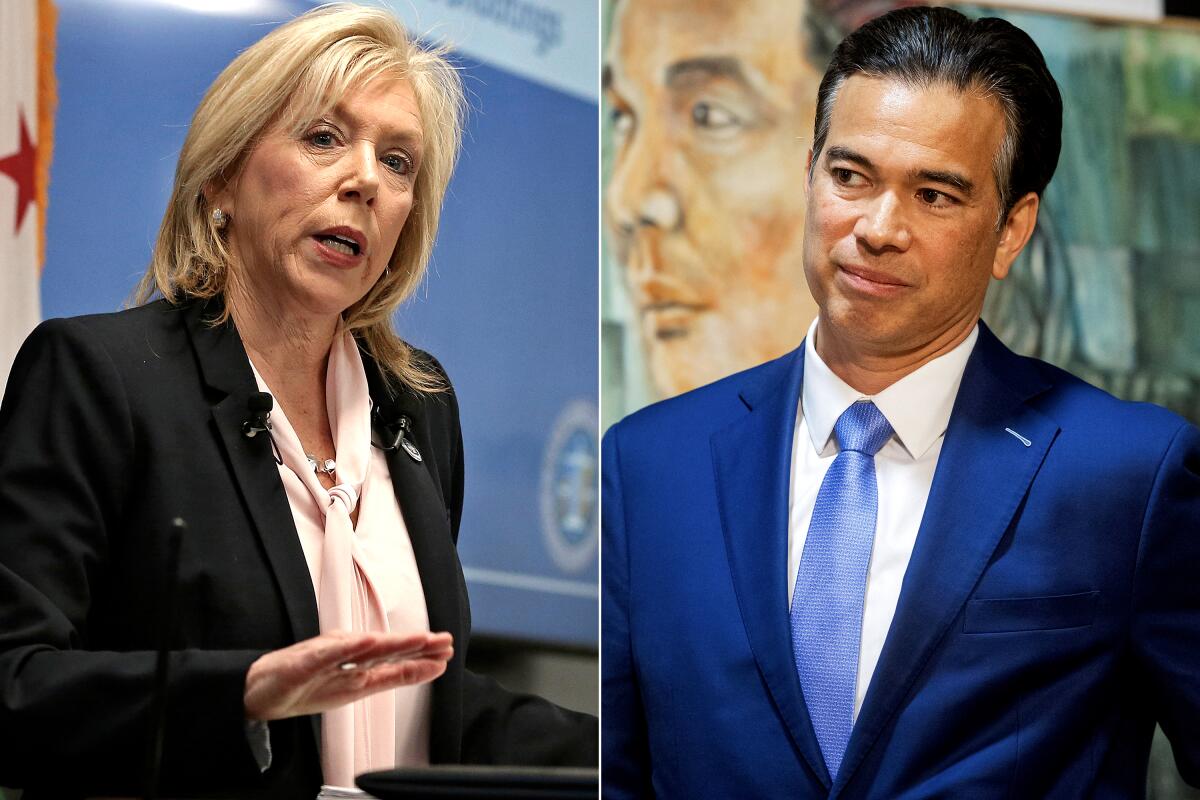Op-Ed: Forget the recall. Conservatives should focus on the California attorney general race

Last week, when Californians got the news that the state would lose a congressional seat and the recall vote to remove Gov. Gavin Newsom qualified on the ballot, an intriguing and important political story unfolded apart from those headlines.
Sacramento County Dist. Atty. Anne Marie Schubert, a former Republican, announced that she would run as an independent for state attorney general in 2022 against Atty. Gen. Rob Bonta, a former state assemblyman, who was recently appointed by Newsom. The attorney generalâs office has often been a steppingstone to higher office. Witness the rise of the three most recent occupants of the office â Xavier Becerra, Kamala Harris and Jerry Brown.
In a state where registered Republicans account for fewer than a quarter of the voters, a ragtag mix of conservatives funded by Republican donors and Trump backers got enough signatures to get a recall vote on the ballot. Successfully ousting Newsom and putting a Republican in office through the recall process, however, seems unlikely, given recent polls.
The fading GOPâs more likely path to relevance might well lie in Schubertâs candidacy. Even though she is a Republican-turned-independent, she could be the way conservative governance makes its way back in a one-party state.
Schubert changed her affiliation from Republican to no party preference in June 2018, after she was reelected to a second term as Sacramento County district attorney. But unlike many other former Republicans, she does not cite Donald Trump as the reason for her switch.
âI have views on both sides of the aisle,â she explained to me last week. âNone of those impact what I do as a DA or will when I become AG.â
Unlike Bonta, Schubert supports the death penalty, a difference that is sure to be an issue in 2022. And as a prosecutor, she argued against a general ban on trying teens as young as 14 as adults if they commit the most serious crimes. The bill passed the Assembly in 2018, with Bonta voting for it; Gov. Brown signed it into law.
Most notably, Schubert was a major proponent of Proposition 20, a 2020 ballot initiative that would have increased sentences for some crimes and reduced the number of people eligible for early parole â essentially rolling back earlier criminal justice reforms. Voters overwhelmingly rejected it.
At the same time, Schubertâs personal background could be appealing for voters who arenât conservative. She is gay and the single mother of two teenage sons. Her brother Frank Schubert, however, ran the campaign for Proposition 8, the 2008 ballot measure that banned same-sex marriage in California. She voted against the proposition, which was ultimately overturned by courts.
As district attorney, she has worked to expand mental health courts, and although she opposed the Newsom-backed initiative in 2016 that legalized commercial sales of marijuana, her office has dismissed old cannabis convictions. Sacramento Mayor Darrell Steinberg, a Democrat, endorsed her 2018 reelection â an indication that she could find support across party lines.
No doubt, getting through the top-two primary system as an independent and into a general election runoff will be difficult for Schubert if a serious Republican enters the race. Primary voters tend to vote for candidates from their parties, and political parties are all but obliged to back their own.
But Schubert already has some public recognition. As a career prosecutor, she gained national prominence for her innovative use of DNA and a genealogy website to identify and prosecute Joseph James DeAngelo Jr., known as the Golden State Killer, who evaded arrest and prosecution for murdering 13 people and committing dozens of rapes over decades.
In an interview, she portrayed her campaign as an effort âto restore safety in our communitiesâ and says that Bonta voted for laws that weakened criminal penalties when he was in the Assembly.
Bonta, the first Filipino American to hold statewide office, is running as a progressive on criminal justice reform. He was a coauthor of 2020 legislation requiring the attorney generalâs office to investigate instances in which police shoot and kill unarmed civilians. At his recent confirmation hearing, Bonta promised to establish a unit to investigate such deaths.
On crime and policing, Schubert takes a harder line. Last month, when she announced her candidacy, she lashed out at Chesa Boudin, the progressive San Francisco district attorney, for âletting violent criminals out with little oversight or consequencesâ â even though heâs not her opponent. Boudin answered with a statement dismissing Schubert as being âcommitted to a failed, tough-on-crime approach where the powerful, especially police who commit acts of violence, are never held accountable.â
Police oversight is sure to be a top issue in the race. California attorneys general, along with district attorneys, are responsible for investigating police shootings of civilians. Schubert faced withering criticism in 2019 for failing to bring criminal charges against two police officers who shot and killed Stephon Clark, mistaking his cellphone for a gun, in his grandmotherâs backyard in March 2018.
Schubert has strong support from law enforcement organizations, having taken no less than $682,000 in campaign donations from them since her first run for Sacramento County district attorney in 2014. Expect Bonta to make that money an issue. But he, too, has benefited from police union money â $190,000 since 2012. He has stopped accepting such money and donated some of it to oppose a 2020 ballot measure pushed by the bail industry to protect the cash bail system.
In this blue state, Bonta, the Democrat, will almost certainly be the front-runner in 2022. But for voters to the right of center, Schubertâs campaign to âspeak for victimsâ could hold the promise of regaining some power in California.
Dan Morain, a former Times staff writer, is author of âKamalaâs Way: An American Life.â
More to Read
A cure for the common opinion
Get thought-provoking perspectives with our weekly newsletter.
You may occasionally receive promotional content from the Los Angeles Times.










